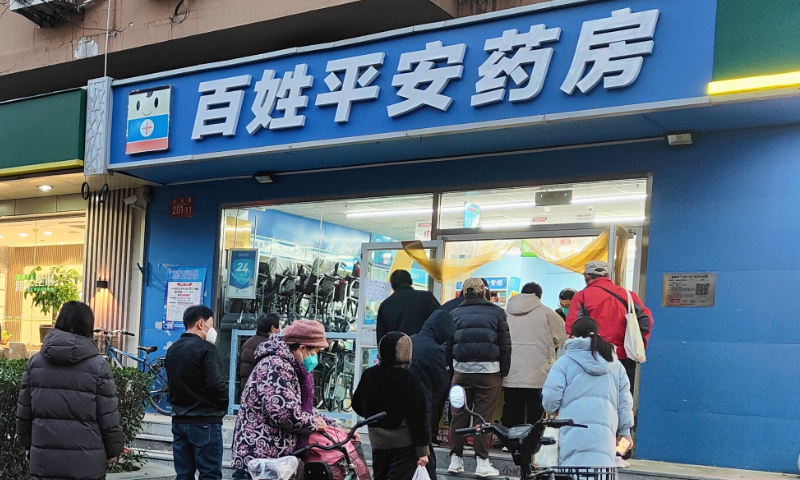
People line at a drug store buying COVID-19 treatment medicines in Beijing on December 8, 2022. Photo: VCG
The National Food and Drug Administration (FDA) vowed to strengthen the quality and safety management of COVID-19 vaccines and therapeutic medicines on Thursday, urging enterprises to continue to comply with the production requirements.
Since the outbreak of COVID-19, drug regulatory authorities at all levels have made all-out efforts to ensure the quality, safety and supply of COVID-19 vaccines and therapeutics, making a due contribution to the fight against the epidemic, Huang Guo, deputy director of the National Food and Drug Administration, said on Thursday.
As the country faces a new situation and new tasks in epidemic prevention and control, people have higher expectations and stricter requirements for the quality, safety and supply of vaccines and medicines, Huang said, adding that the authorities will further strengthen supervision over the production, supply, circulation and use of medical supplies for COVID-19.
The FDA has placed particular emphasis on oversight of the recently approved COVID-19 vaccines for emergency use as well as previously approved COVID-19 treatment medicines such as Azvudine tablets.
From 3 pm on Sunday to 4 pm on Monday,
four new COVID-19 vaccines were approved for emergency use in the Chinese mainland, including three recombinant protein-based vaccines and a nasal spray influenza virus vector vaccine, while the country is trying to enhance the population's immunity amid optimizing COVID-19 prevention measures.
Azvudine, produced by Genuine Biotech, based in Central China's Henan Province, is China's first domestically developed oral drug for COVID-19 treatment. China has also approved Pfizer's COVID-19 pill Paxlovid and the domestic neutralizing antibody therapy BRII-196/BRII-198 for COVID-19 treatment.
In addition, traditional Chinese medicine for the treatment of COVID-19 is also being supervised, and relevant departments are required to conduct targeted management for these medicines.
Huang also said that in view of the rapid growth of demand for COVID-19 medical supplies, the management of the entire supply chain and business activities should be strengthened, and illegal activities should be cracked down on and quality and safety should be strictly controlled.
A total of 4,079 confirmed cases and 17,360 asymptomatic infections were reported in the Chinese mainland on Wednesday, with 43,266 confirmed cases still under medical observation and treatment nationwide as of Monday, according to the National Health Commission (NHC).
Both the NHC and top epidemiologists have suggested stratified treatment for COVID-19 patients, which means asymptomatic and mild cases can be observed and treated at home, while limited medical resources are reserved for those with severe and high-risk conditions.
At least a dozen cities across China have further adjusted and optimized epidemic control measures over the past few days, including scrapping the requirement for frequent mass nucleic acid testing and mandatory COVID-19 test results for taking public transportation.
In cities like Shanghai and Southwest China's Chongqing, reducing the frequency of nucleic acid testing or even canceling regular nucleic acid testing has become an important part of the optimization of epidemic prevention measures. Other places like Beijing and Guangzhou have also explored new measures such as allowing some people who test positive for COVID to be quarantined at home.




